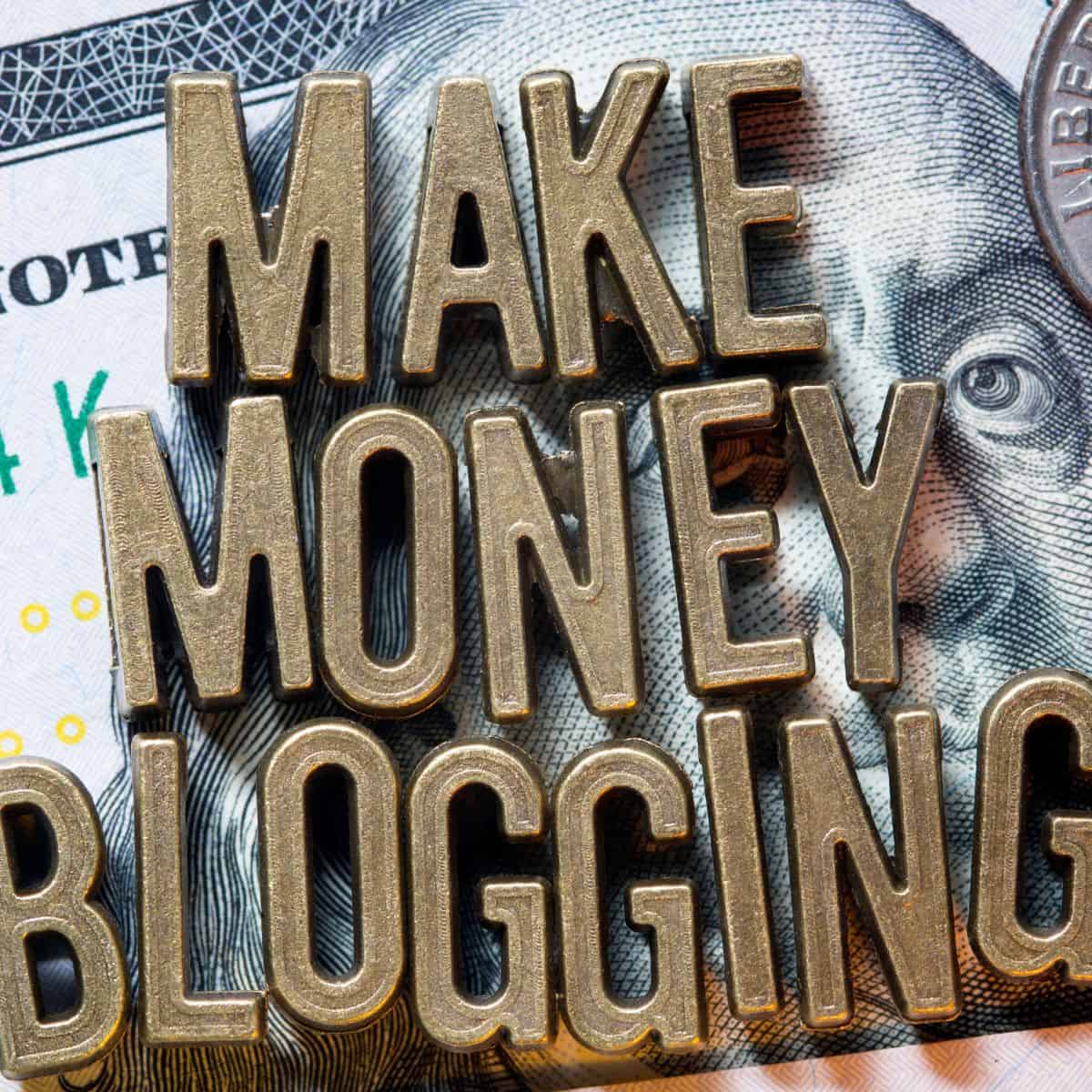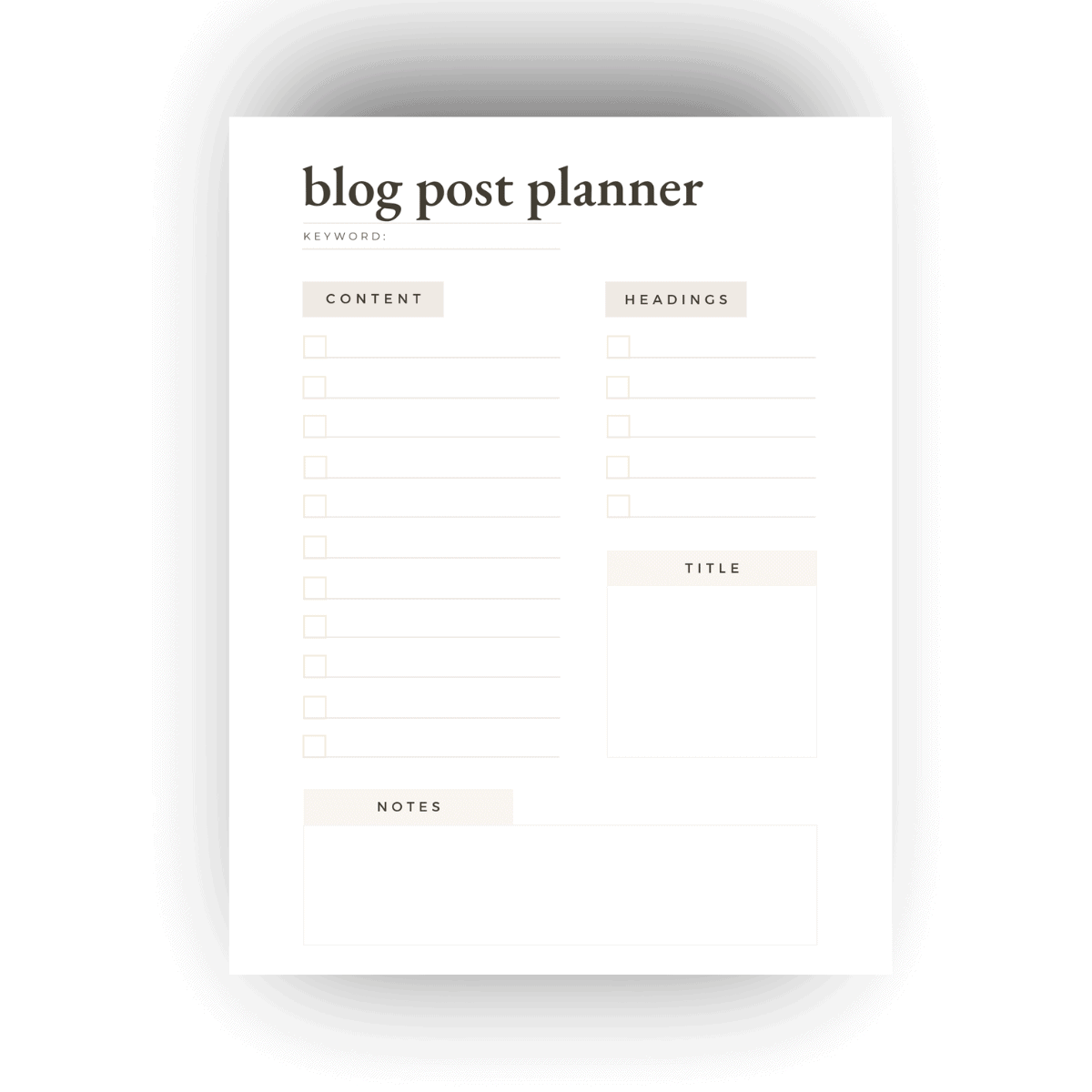Are you wondering, “How do bloggers make money?” Get the answers revealed by a full-time blogger here. You’ll be surprised to hear the answer revealed. Keep reading to learn more about how bloggers make a career out of writing on the internet.

Quick Answer
Most bloggers earn their income by way of some combination of the following:
- display ads
- affiliate marketing
- sponsorships
- products
- services
- memberships/subscriptions
The amount of money bloggers make varies dramatically, from nothing to seven figures a year depending on a variety of factors, including how big their readership is.
My Experience and Expertise
I’m writing this post on my one-year anniversary of becoming a full-time blogger. It’s also three and one-half years after I started this blog, about eight years after I started learning about search engine optimization (SEO), and about twenty years after I created my very first website in college, back in the “Stone Ages” of blogging! So, I know exactly how blogs make money.
While aspiring bloggers can gather some inspiration here too, this post is meant for the non-blogger. It’s meant to inform readers of this blog how their readership translates to dollars –because I think you deserve to know this!
It’s also meant to inform the general public about blogging as a career. Often, in real life, when I say I’m a blogger, most people have heard of the term but don’t fully understand it the way they understand more traditional careers.
So, with this in mind, below I answer the question, “How do bloggers make money?” I discuss both how bloggers get paid and who pays bloggers. Then, I try to answer the very complex question of how much money bloggers make (hint: it’s an extremely wide range), as well as a few more frequently asked questions about how bloggers earn money.
What a “Blogger” Does
First, it’s important to know what the term “blogger” means. Here, I use the term blogger to refer to people who primarily write articles and/or posts on websites. This is somewhat different than a “social media influencer,” who primarily posts content on social media platforms (but there is some overlap).
As a blogger, my main focus is my blog/website and making money from the articles I write on it. I post on social media too, but that’s sort of just a byproduct of my main business — not much different than something like a local restaurant that has social media pages to promote it.
In other words, the main business is different than social media. For a social media influencer, social media content is the main business.
As mentioned, there’s some overlap, as I can make money as a blogger from the audience of both my website and my social media content at the same time. For example, I can sell products both on my blog and my social media channels. To me, the distinction is mostly one of where the primary focus lies.
I also want to note that some bloggers are employed by a company to write articles for the company’s blog as either employees or freelance writers. Those people get paid by the company in exchange for an article, which is different. This post is about sharing how bloggers who run their own websites get paid.
How Do Bloggers Make Money?
Display Ads
Who pays the blogger: ad networks and/or any person, brand, or company that buys ad space directly from the blogger (not the blog reader)
Display ads are third-party marketing images and videos you may often see on websites, including at the bottom of this page, in the sidebar, and sprinkled throughout this post. They are similar to TV commercials and magazine ads.
Bloggers generally get paid for each time an ad is merely seen by a reader for at least one second. The amount is calculated by a rate for every 1,000 views.
Most bloggers rely on ad networks to do ALL the back-end labor on this. There are a variety of ad networks, and they pay a wide variety of rates. I’ve heard as low as $1-2 per 1,000 views, and I’ve heard as high as $100+ per 1,000 views. It depends on the blogger’s ad network and a vast array of statistical factors.
Display ads can also be bought and sold directly between a blogger and a person or company. For example, sometimes authors request display ads for their books on my site.
What’s good about display ads for bloggers is that we can earn income from articles for months and years after we first write them, and they keep content free for the reader.
What’s bad about display ads is that it takes a lot of traffic for the blogger’s income to become substantial, the blogger still has to maintain the site and the articles to both keep and grow traffic, and ads can look unappealing to the reader.
On The Literary Lifestyle: Ads account for a large percentage of my income.
Affiliate Marketing
Who pays the blogger: People, brands, and companies that sell products or services (not the blog reader)
Affiliate marketing refers to the process by which bloggers can earn commissions by referring customers to purchase other company’s products (or take some other specified action, like signing up for a newsletter) through a trackable link.
Usually, a blog reader would have to click on a link that has a blogger’s unique code embedded in it, and then purchase an item within a certain time frame for the blogger to get paid.
The commissions can generally range from pennies to $50-100+ per sale. Bloggers usually receive a small percentage of the total sale amount, which is why the commissions vary so much.
One thing that’s great about affiliate marketing is that bloggers generally earn commissions on the sale total. So, if you click on a link for a book, and then end up buying a TV (or both), the blogger can get a commission on everything you purchase, not just the book. Another great thing is that bloggers can make sales long after writing articles that promote the links.
I also love that affiliate marketing helps keep my content free for the blog reader, and I can pick whatever products I want to promote, as well as talk about them however I want.
There’s a lot that’s bad about affiliate marketing, though. For example, someone can be influenced by a blogger online, and then go into the store to make their purchase, voiding any commission. Companies can also change the terms of their program, so bloggers may put in a lot of work creating content upfront, only to have the commissions reduced or completely canceled.
Additionally, someone can learn about a product from both you AND someone else, but only the last person whose link is clicked earns a commission.
Lastly, average conversion rates are low (1-2%), so, again, bloggers have to build up volume to make substantial affiliate income
On The Literary Lifestyle: Affiliate marketing accounts for a large percentage of my income, and most of this income comes from my blog/website and not social media.
Related Post: The One Affiliate Marketing Platform Every Creator Should Join
Sponsorships
Who pays the blogger: People, brands, and companies that sell products or services (not the blog reader)
Sponsorships generally mean that a company has paid a blogger to talk about its product or service on the internet. The sponsor may also pay for ownership or licensing rights for to re-use the content created, as well as a variety of other terms.
What’s good about sponsorships is that it helps keep content free for the blog reader. Sponsorships can also help bloggers know exactly what they are going to earn from a project ahead of time.
There’s also a lot that’s bad about sponsorships too, though. They can be both hard to get PLUS a lot of work. Most of my sponsorships have taken months of negotiating, planning, producing, editing, approving, posting, and reporting. They also make me feel a lot of added responsibility to give the brand its money’s worth.
Additionally, sometimes sponsorships never pan out after a lot of negotiation and/or attempting to collect payment can be hard.
Lastly, again, bloggers need a substantial following to earn substantial money from them.
Sponsorship income can range from a free product to thousands of dollars (or even tens of thousands of dollars).
On The Literary Lifestyle: Sponsorships account for a small percentage of my income, and most of this income comes from my blog/website and not social media. All bloggers differ.
Products
Who pays the blogger: the blog reader
This refers to a blogger’s OWN products, such as handmade goods, books, or digital products (like my Reading Journal).
What’s good about this is that it can provide the reader with something beyond free blog content.
On the negative side, some products require a lot of management from a business perspective.
On The Literary Lifestyle: Products account for a small percentage of my income, and most of this income comes from my blog/website and not social media.
Services
Who pays the blogger: any person or company that purchases them, including the blog reader
Many bloggers also earn money via services, and these services can take on an infinite number of forms, such as coaching, consulting, creating content, managing social media, and so on.
A lot of bloggers use services to supplement the other types of blogging income while their blogs are growing. Some bloggers even use their blog as a marketing tool for their service. For example, I know a very successful home decor blogger who uses her blog as a way to grow her interior design business.
On The Literary Lifestyle: Services account for zero percent of my income.
Memberships/Subscriptions
Who pays the blogger: any person or company that purchases them, including the blog reader
The final answer to the question, “How do bloggers make money?” is memberships and subscriptions.
Subscriptions are essentially payments by the reader for exclusive content. Memberships can be like subscriptions, but they can also take on a variety of forms, such as clubs, mastermind groups, discussion forums, etc. Some bloggers also sell e-courses as memberships.
Memberships can give the reader more 1-on-1 access to the blogger, but the content isn’t free.
On The Literary Lifestyle: Memberships and subscriptions account for zero percent of my income.
How Much Do Bloggers Make?
How much bloggers make varies dramatically based on their unique readership, their unique sources of income, and how effectively these income sources are implemented.
And remember, in addition to blog earnings varying dramatically, blogs are also businesses that pay expenses, taxes, government fees, payroll, marketing, and so on.
Some bloggers make $0, and some bloggers make over $1 million (yes, really) per year.
For more specific numbers: I have used the data in the video below as a guidepost for years now, and I have found that it offers pretty good averages overall at a variety of levels.
But, note that the blogger also needs a solid business strategy that’s well-implemented.
Eb over at Productive Blogging also published these updated statistics about the general range of bloggers’ income.

FREE BONUS
Get your exclusive printable PDF blog post planner when you subscribe to The Literary Lifestyle’s free email newsletter community.
Frequently Asked Questions
Most profitable bloggers earn money from some combination of the following: display ads, affiliate marketing, brand sponsorships, product sales, services, memberships, and/or subscriptions.
It varies greatly. Bloggers can make anywhere from $1 to $100+ dollars per 1,000 views, depending on a large variety of factors, including how they choose to monetize their blog.
It is not common for beginner bloggers to make money. Most bloggers do not make money until at least their second year of blogging.
It depends. Some bloggers never profit and others earn full-time incomes from blogging. It generally takes consistent work over several years for a blog to be profitable.
Conclusion
The answer to the question, “How do bloggers make money?” is a complex and multi-faceted one. Most bloggers rely on a combination of display ads, affiliate marketing, brand sponsorships, product sales, services, memberships, and/or subscriptions to make money. The amount of money bloggers make varies dramatically, from nothing to seven figures a year depending on a variety of factors, including how big their readership is.
If you like learning about blogging, check out more blogging tips.



How can I Blog